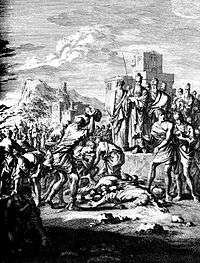Naboth

Naboth (Hebrew: נבות) "the Jezreelite" is the central figure of a passage from the first Book of Kings in the Hebrew Bible. Queen Jezebel arranged to have him judicially murdered because her husband, King Ahab coveted Naboth's land. This action set in motion the ultimate destruction of the Omrid dynasty.[1]
Narrative
According to I Kings 21:1-16, Naboth owned a plot of land close to the palace of King Ahab, who wished to acquire it for a vegetable[2] or herb garden.[3] Naboth, however, had inherited his land from his father, and he refused to sell it to the king.[4] Since it was an inheritance, the law forbade him from selling it outright. [5]
Frustrated at not being able to procure the vineyard, Ahab returned to the his palace and went to bed without eating anything. His wife, Jezebel, after learning the reason for his being upset, asked mockingly, "Are you not the king?"[2] She then said that she would obtain the vineyard for him. To do so, she sent a letter, under royal authority, directing the Elders to proclaim a fast and set Naboth on high and then for two sons of Baal to falsely charge Naboth with blasphemy and incite his death by stoning. She also directed the verdict and sentence. The execution of Naboth took place outside the city, where the dogs licked up his blood. Emil G. Hirsch points out that "It seems from II Kings ix. 26 that Naboth's sons perished with their father, probably being killed soon afterward by order of Jezebel in order that they might not claim the vineyard as their inheritance."[3] After Naboth had been stoned to death, the Queen told Ahab to take possession of the vineyard.[2]
As punishment for this action, the prophet Elijah visited Ahab while he was in the vineyard, pronouncing doom on him. Ahab humbled himself at Elijah's words, and God spared the king accordingly, instead postponing the prophesied destruction of Ahab's house to his son's time.[1] Johannes Pedersen said that "The story teaches us that the king is bound to respect the proprietary rights of families..."[6]
Interpretations
Archaeological exploration conducted by the University of Haifa and the University of Evansville discovered an ancient winery in the vicinity of an Iron Age IIB (900–700 B.C.E.) military enclosure at the foot of Tel Jezreel.[1] While not definitely identifying the site as the location for the story of Naboth, archaeologist Dr. Norma Franklin, of the University of Haifa said that the vineyard appears to have been established sometime prior to 300 BCE, which would not be inconsistent with the time frame for Naboth. Franklin further noted, "Owning a vineyard would make him wealthy since wine was an important commodity. I reckon that since he was from the aristocracy he probably lived in Samaria and had more than one vineyard. This would give a slightly different picture than the Bible, which implies, though does not state explicitly, that he was a poor man being abused by the wealthy king."[5]
Francis Andersen observed that "Commentators have seen in the episode a clash of Israelite and Canaanite ideas of kingship, of citizenship, and of property."[6]
Jewish medieval scholars sometimes used Elijah's words to Ahab "You have killed and also taken possession" ("הֲרָצַחְתָּ וְגַם יָרָשְׁתָּ") or the expression "Naboth's vineyard" to hint at double injustice (or crime committed with indecency, as opposed to "simply committed" crime). The Talmud also sees here a link to the prohibition of mixtures of milk and meat in Jewish law.
Roger Williams, the founder of the American colony of Rhode Island and the co-founder of the First Baptist Church in America, wrote about Naboth's story in The Bloudy Tenent of Persecution for Cause of Conscience as an example of how God disfavored Christians from using government force in religious matters, such as the religious decrees by Jezebel and Ahab. Williams believed using force in the name of religion would lead to political persecution contrary to the Bible.[7]
In popular culture
James Smetham did a 1856 oil painting of "Naboth in his Vineyard".[8]
Naboth was played by Ludwig Donath in the 1953 film Sins of Jezebel. The plot of the 2014 film Leviathan, about a man's struggle against a corrupt mayor's appropriation of his land and house, has been compared by critics to Naboth's life.
References
- 1 2 3 Dospěl, Marek. "Naboth’s Vineyard Unearthed at Tel Jezreel?", Bible History Daily, Biblical Archaeology Society, November 6, 2017
- 1 2 3 Isaacs, Jacob. "The Murder of Naboth", Chabad.org.
- 1 2 Hirsch, Emil G. and Seligsohn, M., "Naboth", Jewish Encyclopedia
- ↑ Jamieson-Fausset-Brown Bible Commentary on 1 Kings 21, accessed 5 November 2017
- 1 2 Zaimov, Stoyan. "Archaeologist Discovers Proof for Biblical Vineyard of Naboth", The Christian Post, July 13, 2017
- 1 2 Andersen, Francis I. “The Socio-Juridical Background of the Naboth Incident.” Journal of Biblical Literature, vol. 85, no. 1, 1966, pp. 46–57. JSTOR
- ↑ James P. Byrd, The challenges of Roger Williams: religious liberty, violent persecution, and the Bible (Mercer University Press, 2002) (accessed on Google Book on July 20, 2009)
- ↑ "Naboth in his Vineyard", Tate
![]()